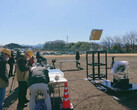Last week, Fervo Energy announced a monumental achievement in the world of clean energy through a press release detailing the success of its next-generation enhanced geothermal system (EGS) at Cape Station. This new achievement in renewable energy is powered by a drilling technology adapted from the oil and gas industry.
Fervo’s Sugarloaf well, drilled to a true vertical depth of 15,765 feet (4.81 km) in just 16 days, marks a significant step for EGS technology. It’s projected to hit a bottomhole temperature of 520 °F (271.11 °C), making it Fervo’s hottest and deepest well yet. Per Fervo's data, the drilling time beat the US Department of Energy’s baseline for ultra-deep geothermal wells by 79%, setting new records with a maximum bit run of 3,290 feet (1 km) and an average penetration rate of 95 feet (28.96 m) an hour.
The well leverages Fervo’s advancements in horizontal drilling and fiber-optic sensing, raising the efficiency of thermal energy recovery to about 50–60% — about 3 times the efficiency of conventional geothermal systems, claims a DeGolyer & MacNaughton report. This efficiency supports Fervo’s Cape Station project, set to deliver 100 MW by 2026 and 400 MW by 2028. Fervo’s Cape Station, validated by the same report, could support over 5 GW at depths up to 13,000 feet (3.96 km). Contracts with Shell Energy and Southern California Edison are already in place.
Here is how it performs compared to earlier projects:
- 15,765 feet (4.81 km) depth vs. Project Red’s 7,700 feet (2.35 km)
- 520 °F (271.11 °C) vs. Project Red’s 376 °F (191.11 °C)
- 16 days of drilling vs. 76 days for DOE baseline
- 95 feet (28.96 m)/hour vs. 50 feet (15.24 m)/hour industry average
This is a big step in the direction of replacing our present-day energy sources based on fossil fuels with clean and renewable energy sources.
NB: While the performance validation was conducted by the independent firm DeGolyer & MacNaughton, the report was commissioned by Fervo Energy. As with any company-funded assessment, broader industry and independent academic validation will be important for full confirmation of the results.















